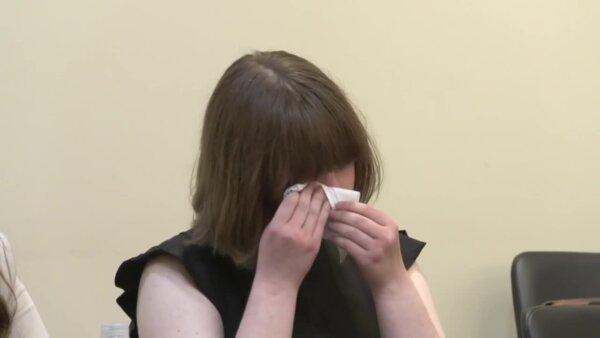Carly Gregg, a 15-year-old Mississippi girl accused of murdering her mother and attempting to murder her stepfather, appeared in court on Tuesday, September 10, 2024. The hearing focused on motions filed by the prosecution to exclude defense witnesses and evidence due to missed discovery deadlines. Gregg’s defense team faced sharp criticism from Judge Dewey K. Arthur for their repeated failure to meet these deadlines, raising concerns about the fairness of the upcoming trial scheduled for the following week.
 Carly Gregg wipes away tearsCarly Gregg during a motions hearing on September 10, 2024. (Court TV)
Carly Gregg wipes away tearsCarly Gregg during a motions hearing on September 10, 2024. (Court TV)
Gregg is charged with first-degree murder in the death of her mother, Ashley Smylie, and attempted murder of her stepfather, Heath Smylie. The defense has indicated their intention to pursue an insanity defense. During the hearing, Gregg, dressed in a black sleeveless dress, appeared visibly distressed and was seen wiping away tears.
The prosecution argued that the defense’s failure to provide a witness list by the August 20th deadline, and the subsequent late disclosure of minimal information on September 3rd, severely hampered their ability to prepare for trial. They requested the court to bar any witnesses or evidence disclosed after the original deadline. The defense acknowledged the missed deadline, arguing that the prosecution also submitted a report from their expert witness on September 9th. Judge Arthur rejected this argument, citing multiple missed deadlines by the defense and accusing them of attempting to “bushwhack” the prosecution at trial. The judge ruled to exclude at least one defense witness and limited the scope of testimony for others due to these discovery violations.

A key witness for the defense, Dr. Andrew Clark, a mental health expert, is expected to testify about Gregg’s mental state at the time of the alleged crimes. However, the prosecution argued that Dr. Clark’s report doesn’t meet Mississippi’s legal standard for insanity, addressing only “diminished capacity,” which is inadmissible during the guilt phase of the trial. Judge Arthur granted the prosecution’s request to interview Dr. Clark on Wednesday, September 11th, with the possibility of further questioning during a hearing scheduled for Friday, September 13th.
While remaining evasive about the specifics of their defense strategy, Gregg’s attorneys confirmed they would not be pursuing an involuntary intoxication defense. This was notable because in a previous hearing, the defense had suggested that a recent change in Gregg’s antidepressant medication might have influenced her behavior.
The issue of drug use also emerged during the hearing. The defense sought to suppress the results of a urine drug test administered to Gregg at the Rankin Youth Detention Center immediately following her arrest, which revealed the presence of cannabinoids (marijuana). Judge Arthur granted a partial victory to the defense, ruling that the test results would only be admissible as part of the prosecution’s rebuttal case if the defense pursued an insanity plea.
Defense attorney Kevin Camp attempted to persuade Judge Arthur to transfer the case to youth court. Rankin County Youth Prosecutor Corey Garber testified against the transfer, citing the seriousness of the charges. Judge Arthur concurred, stating that transferring the case would essentially amount to an acquittal, which he deemed inappropriate.
Rankin County Courthouse (Brandon, MS) – Image Source: Wikimedia Commons
This case raises important questions about the complexities of the legal system, particularly when dealing with juvenile offenders. The defense’s struggles to meet deadlines, the potential impact of mental health on criminal responsibility, and the admissibility of drug test results are all crucial factors that will shape the outcome of this trial. As the trial date approaches, the clash between the prosecution and defense continues, leaving the ultimate fate of Carly Gregg uncertain. The upcoming trial promises to be a closely watched legal drama, with significant implications for the defendant and the pursuit of justice.
This complex case involves allegations of murder, attempted murder, questions of mental competency, and the intricacies of legal procedure. The upcoming trial will undoubtedly delve into these issues, seeking to determine the truth behind the tragic events and render a just verdict. The legal battles leading up to the trial underscore the challenges faced by both the prosecution and the defense in navigating the complexities of the legal system. The outcome of this trial will have a profound impact on the life of Carly Gregg and provide valuable insights into the application of the law in cases involving juvenile offenders.